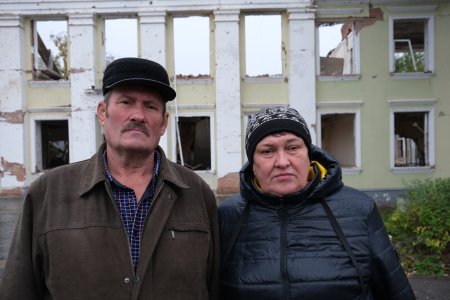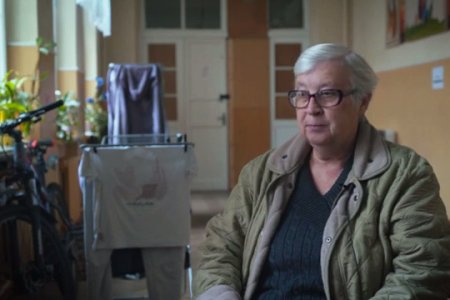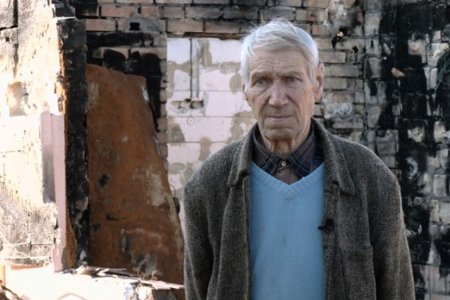I am Vasyl Markhonos, born in 1947. I worked as a driver for 45 years. In Soviet times, I even had to go to Moscow occasionally. I have been there several times by truck. I lived in the city, and when my parents died, I moved to Borodianka. I got used to rural life — I have a garden and a cellar. I used to go to the market in Hostomel.
— Did you expect a full-scale war?
— No, absolutely no preparation. I doubted how it could be. How?! It didn’t fit in my head. We have been told that we are brothers all our lives. I didn’t even think it was possible until the end. When I talked to my daughter, who lives in Obolon [Kyiv’s district], it was unclear whether Russia would attack. Something would happen or not. But on the 24th, the first house down the street was bombed at ten in the morning, and our firefighters arrived. Then, a day later, it began throughout the village ... They crossed the Irpen several times and blew up our bridges: Hostomel and ours, concrete. Afterward, they began to make pontoon crossings. There were soldiers and tanks around. Here, across the street, our soldiers stood 300 meters away. I have a well, and they came for water.
— What was 24 February like for you?
— My daughter called, she said that the war started, the offensive. And we finally saw everything at about noon, when the first shell exploded nearby. People were leaving, but I had problems with my leg. I am a disabled person in the first group. Where should I go? My neighbor had a cellar. We seemed to be safe there. And so we survived. We knew when their cannonade began and where the shells were going. Mostly, they blasted toward Pushcha and Horenka through the forest. Then, approximately a week and a half later, ours placed mortars near the club. And they [the Russians] started to shoot… They razed everything to the ground right up to the lake. We could not go anywhere because it was not clear what was happening and where. Three of us ran, and they were killed. It was terrible. But somehow, we got used to it. We already knew what was flying from where.
— What about your house?
— One day I came home to cook food, and everything happened at that moment. I remember being thrown to the floor. Then I came to my senses and crawled into the garden. And there, near the barn, I watched the house. It was not a flame but some kind of glow. The doors and the windows were blown out along with the frames. Over time, I completely came to my senses and realized everything was on fire. They were incendiary shells or whatever they were called. I barely got out. I feel bad for the dog; he also went into the house and couldn’t get out because there was such a temperature that even at a distance of ten meters, it was impossible to survive. True, he jumped out, but all burnt. He lived for a day, and I buried him in the garden. I got up and moved a hundred meters away from the barn because it was impossible to be there.
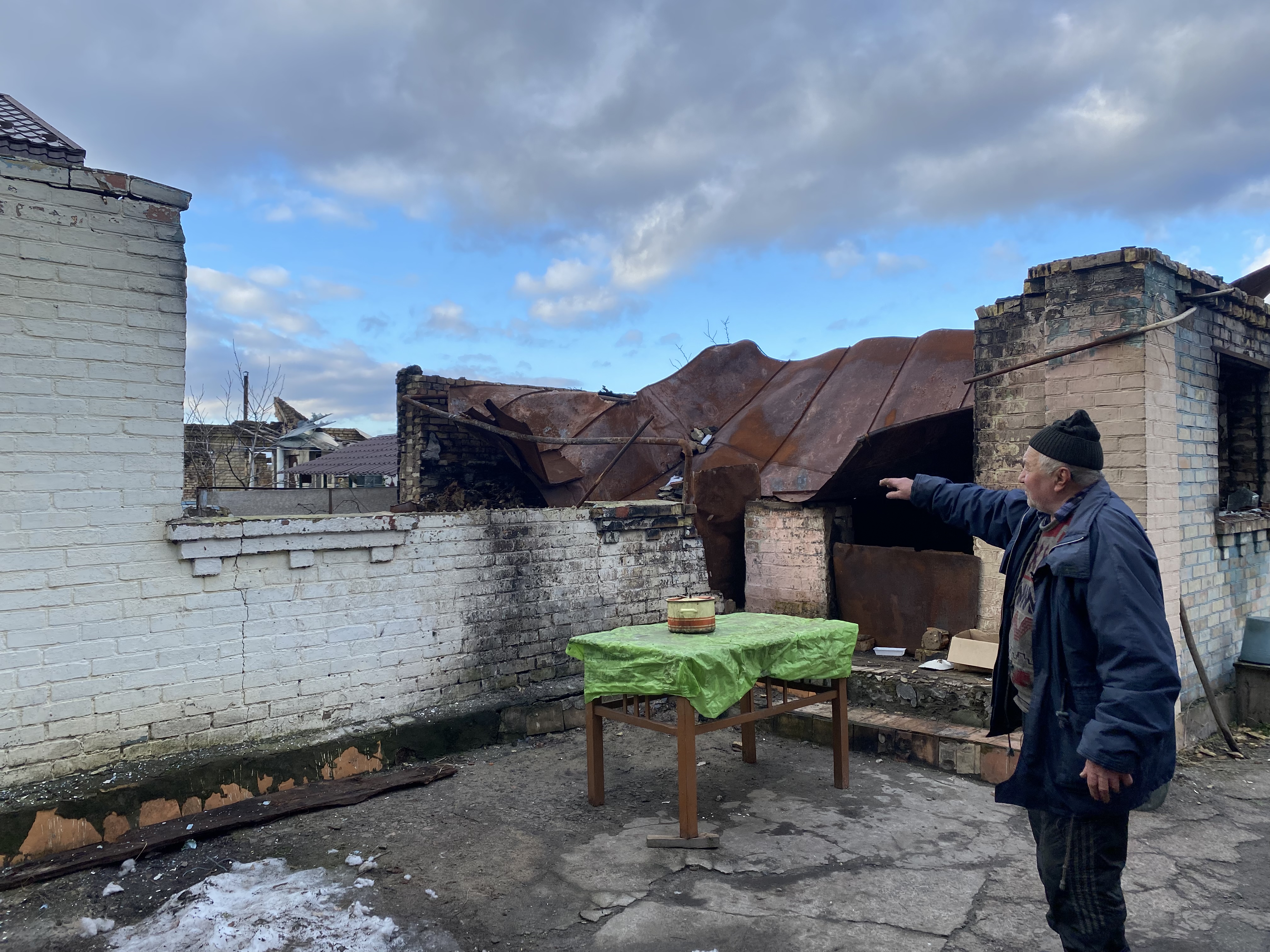
The temperature was so high that everything in the house melted. Perhaps, there were some high-temperature explosives. It is still hard to understand all this. It was at the end of March. My house was the last to be destroyed. I was saved because I was cooking in the summer kitchen in the corner. Traces of shells are still visible there. They flew literally ten centimeters from me. That was horrible.
— How many houses were destroyed in your village?
— Forty percent, for sure. Bombs hit the same house three times and also the sawmill. Shells flew until everything burned down. Neighbors were also twice unlucky. First, a two-family home was bombed, and three days later, all the outbuildings, including a garage and a shed.
— Were there looting?
— People said they were looting. The guy came to the store. And earlier, the Russians shot at the store and made a hole to go inside. He also wanted to come in, but he was almost killed. They cleaned out the store entirely. Cars drove up to pick up goods. But we did not go to look. Thank God they did not reach my house; only two kilometers left. I don’t even know what it would be.
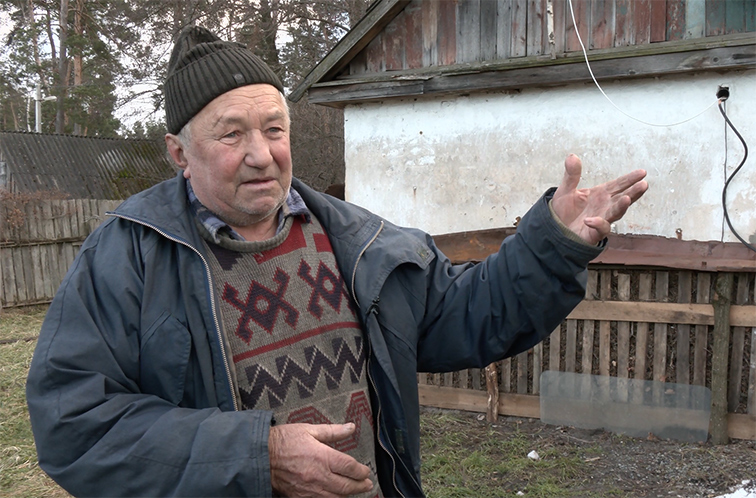
— What are you planning to do next?
— I hope to get some help. Here is my summer kitchen. I collect iron sheets and patch up the damaged roof to keep the rain out. God grant all this ends soon. I am now repairing the roof and have a lot of plans. I want to do something to live more or less normally. Rebuild the house. In the summer, you can still live when there is light, and I turn on the heater; when the temperature is above zero — more or less. Also, volunteers help.
— Has your attitude towards Russians changed?
— Oh, there are many words to say. They are nonhumans! Ukraine seems like a splinter for them that gets in the way. They do not consider Ukrainians to be people. Their propaganda began twenty years ago. I have no words for them. These are monsters, not people. When you see what they did to us — I have acquaintances in Bucha and Irpin… It is now impossible to change our attitude towards them. I think the millennium will pass, but it will not change.
